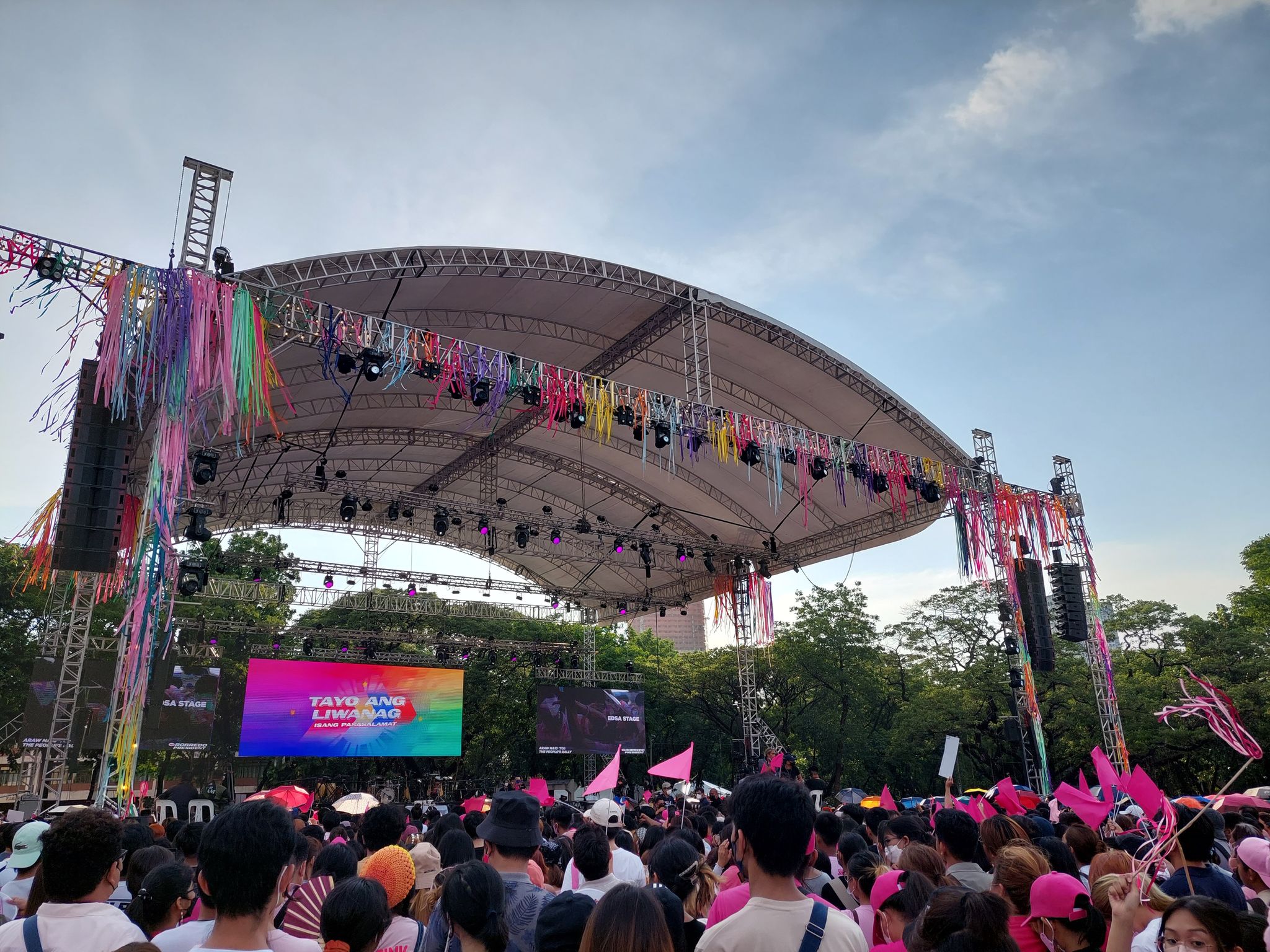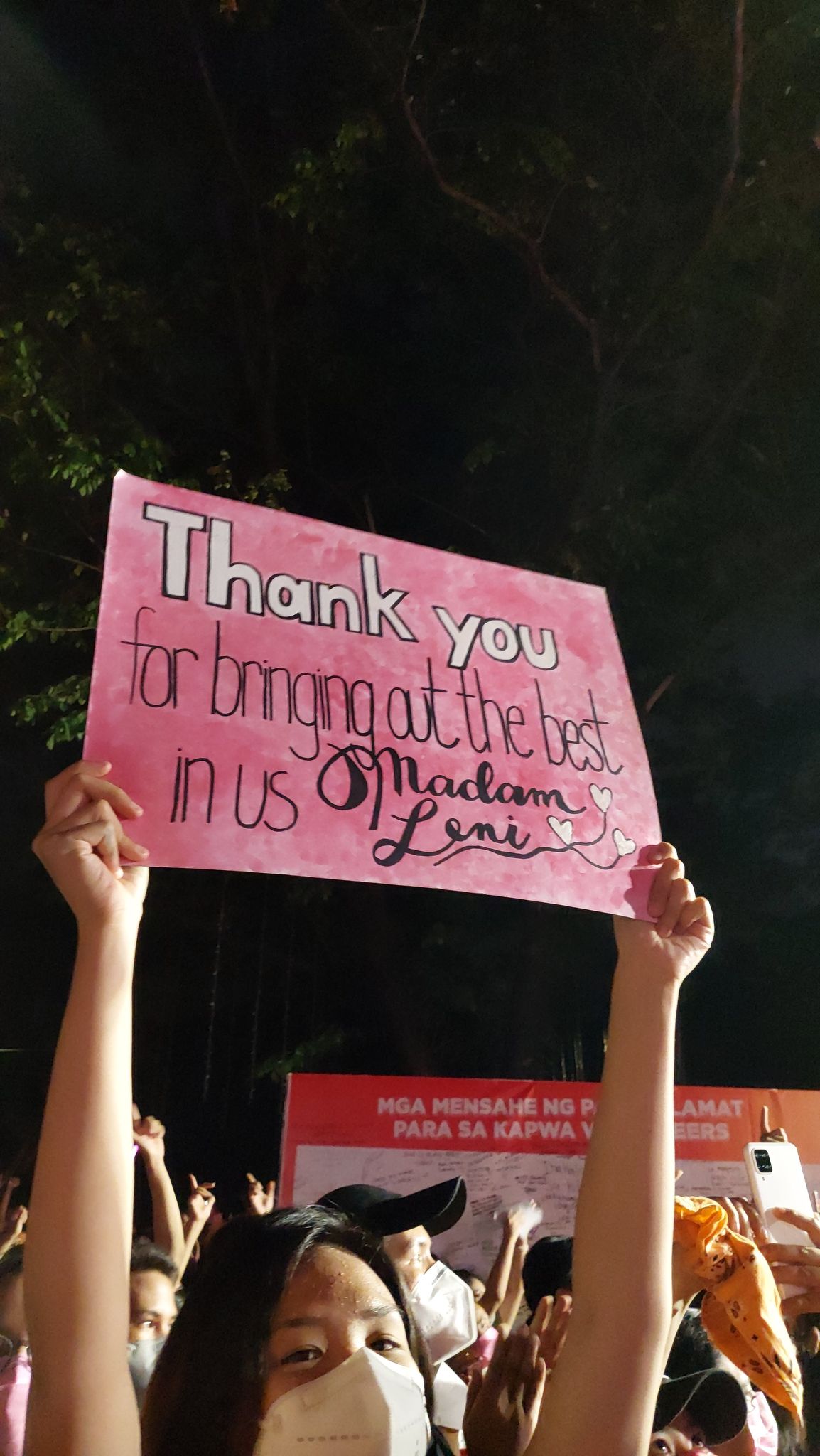“Huwag kang manghinayang
Hindi tayo nabigo
Tibayan ang iyong loob
At kahit may dilim na umaaligid
Ang liwanag sa puso’y ‘di pasisiil
Namulat sa pag-asa, sa pag-ibig
Hindi na muling pipikit”
The defeat of Leni Robredo in the 2022 Philippine presidential election sent shockwaves across the nation. As a staunch Kakampink1 who firmly believed she was the leader our country needed, I was heartbroken by her loss. More than personal grief, I felt profound concern about what her defeat represented—the dominance of disinformation, historical revisionism, patronage politics and voter disempowerment now threatening our democracy’s future.
Robredo, a former human rights lawyer, congresswoman and vice president, was a credible opposition leader with a record of public service. As a candidate, she championed issues like poverty alleviation, education reform, universal healthcare, agriculture policy and anti-corruption efforts. Her platform embodied hope for progress, transparency and social inclusion after years of creeping authoritarianism.
Robredo’s loss highlights how these malign forces have become entrenched in the Philippine political landscape. Her opponent Ferdinand “Bongbong” Marcos Jr. epitomizes this—his family legacy whitewashed by online propaganda, his victory enabled by billions of stolen wealth, his rise heralding the return of outright historical denialism to Malacanang Palace.
Marcos Jr. successfully weaponized social media disinformation networks to recast his family’s corrupt authoritarian rule as a “golden age.”2 Facebook, YouTube, and TikTok videos glorifying the Marcos years as an era of prosperity and order flooded Philippine digital platforms, spread by well-funded propaganda networks. Hashtag campaigns like #ferdinandmarcos, #imeldamarcos, and #sandromarcos overran these platforms, brainwashing younger Filipinos with historical revisionism, framing the dark days of martial law as an illusion concocted by “biased media.”3 Videos portraying Sandro Marcos as a teen heartthrob leveraged the Filipino fondness for celebrities to endear the family to young audiences.
Mainstream media outlets, wary of backlash from pro-Marcos online mobs, tread carefully around facts contradicting this narrative. News organizations and journalists who rigorously critiqued Marcos faced vicious troll attacks. ABS-CBN, once among the few mainstream media giants critical of Marcos, endured intimidation through Congressional hearings and regulatory actions.
Against this overwhelming disinformation apparatus, truth struggled to reach voters, particularly younger citizens lacking direct martial law experience. The Marcoses successfully rebranded themselves from crony kleptocrats into benevolent saviors. Historical facts drowned in a deluge of lies. Those who tried to correct the record faced online harassment and intimidation.
This massive machinery also pumped out targeted disinformation against Robredo, falsely portraying her as stupid, incompetent, elitist and even communist. But absent sustained mainstream media scrutiny on Marcos, or mass voter education by the government, most Filipinos lacked the discernment to parse fact from fiction.
The patronage networks of local political dynasties also mobilized en masse to deliver votes for Marcos. Provincial leaders beholden to the Marcoses for kickbacks, favors and protection urged constituents to support him. Grassroots volunteers and organizers assisting Robredo faced pressure and violent threats in remote areas dominated by entrenched local power brokers loyal to Marcos.
Vote-buying efforts also intensified, with officials openly distributing 500 or 1000 peso cash envelopes to impoverished voters in exchange for voting Marcos-Duterte. In a country where millions live in deep poverty, the lure of instant cash is difficult to resist. Vulnerable voters readily exchanged their democratic right for short-term relief without recognizing the long-term consequences of enabling a Marcos presidency.
These factors—a well-funded disinformation network, the silencing of critical media, loyalty of patronage networks and widespread vote-buying—successfully manipulated an uninformed electorate. They drowned out Robredo’s message of good governance and social inclusion with falsehoods and short-term incentives. Discernment surrendered to ignorance, truth to lies.
As a result, Filipinos voted against their own interests, choosing the undeserving son of a dictator instead of Robredo’s clean track record and reform agenda. His landslide win reflects the total failure of our electoral and educational systems to empower discerning voting choices, not the superiority of Marcos. It reveals how disinformation, cults of personality and patronage can hijack democracy when voters fail to interrogate records, policies and competence.
The contrast is painful. While Kakampink volunteers like me sacrificed enormously spreading Robredo’s platform in communities, the Marcoses did not even bother crafting a policy agenda. For them, only power mattered—not truth or sound policy. While Robredo’s campaign engaged voters on issues relevant to their lives, the Marcoses focused on discrediting her, rehabilitating their brand and consolidating patronage.
Robredo’s campaign relied on volunteer passion, authenticity and grassroots engagement on real issues—food security, poverty, corruption. We optimistically hoped that direct voter interaction could counter the lazy falsehoods peddled by propaganda. We held house-to-house visits, town halls, cultural events fusing music and politics.
Robredo herself tirelessly traveled the country bringing her platform directly to forgotten grassroots communities neglected by politicians. She listened to people’s struggles, gaining trust through conversation. Her sincerity sparked hope in cynical citizens accustomed to empty election season promises and self-interested politicians. I witnessed rural crowds cheer as Robredo pledged systemic reforms to uplift farmers, fisherfolk and marginalized groups.
Her volunteer network grew exponentially, manifesting people’s yearning for Robredo’s unifying matriarchal leadership. Artists, celebrities, professionals and students set aside careers and academics to campaign for her. Supporters called it a “pink revolution” led by ordinary Filipinos rather than politicians. It felt like “People Power” unfolding again after decades of disillusionment.
Despite knowing we were up against virtually unlimited resources, we stalwart volunteers believed Filipinos would choose honesty and good governance when they recognized the opportunity Robredo represented. But in hindsight, volunteer passion alone could not undo the decades of myth-making, disinformation and patronage politics enabling Marcos’ return.
Against the barrage of deception, our truth-based platform struggled to penetrate the walls of ignorance and apathy. Social media amplified viral lies compared to nuanced truths shared through organizing. Our movement lacked the funds to counter false narratives on a massive national scale.
I cannot deny feeling utter dismay on May 9, 2022 as initial results showed a Marcos landslide victory. That night, many Kakampink volunteers wept openly while others were rendered speechless by shock and frustration. Alongside personal heartbreak, I grappled with the ominous implications of Marcos ascending to power.
 Tayo ang Liwanag Isang Pasasalamat | Ateneo de Manila University | May 13, 2022 | 📸 Photo by Mark Anthony Llego
Tayo ang Liwanag Isang Pasasalamat | Ateneo de Manila University | May 13, 2022 | 📸 Photo by Mark Anthony Llego
Her May 13 farewell speech at Ateneo de Manila University reminded volunteers to accept results, while noting allegations of irregularities needing investigation. She highlighted how her movement sparked renewed volunteerism and civic engagement among Filipinos. The grassroots groups formed have demonstrated what people can achieve when contributing to a greater cause. Though lies and anger may have won this battle, seeds of truth and democracy have been planted.
Marcos’ win signals historical revisionism and patronage defeating truth and democracy. It shows Filipinos falling again for superficial propaganda and personality politics rather than interrogating competence and policy. After volunteers worked so hard, it was devastating to see the nation reject Robredo’s leadership and empower the Marcoses again.
But succumbing to dejection would mean abandoning Robredo’s vision. Her speech reminded us to keep faith. Her light will guide us as we work to make that faith a reality.
Moving forward, Robredo’s Kakampink volunteers must keep engaging citizens politically, countering historical revisionism with facts, combating patronage through anti-corruption advocacy, empowering discerning voting. I hope her movement evolves into a broad force advocating systemic reforms beyond one election cycle.
Legislative changes are needed to secure free, fair and informed democracy—anti-political dynasty laws, electoral reforms, stronger prohibitions on vote-buying, disinformation and premature campaigning. Pressure must come from organized citizen groups.
Alongside national advocacy, grassroots voter education remains vital. This defeat must not deter volunteers from continuing house-to-house community engagement beyond elections. Building critical citizen consciousness at the ground-level is key to defeating patronage, disinformation and enabling marginalized Filipinos to exercise their democratic rights.
Our greatest weapon remains truth. But defeating systematic lies weaponized to erode democracy will require the collective action of not just a committed few, but all Filipinos who believe in freedom, human rights and good governance.
Though the path ahead seems daunting, I choose to continue striving to fulfill the principles Robredo and her movement represent—“Gobyernong Tapat, Angat Buhay Lahat.” Her defeat pains me deeply. But I refuse to surrender to cynicism and authoritarianism. Robredo’s call for hope, truth and love of country stays alive in our hearts as we pick ourselves up and keep fighting.
This is undoubtedly a dark chapter in our history. But the Filipino people have overcome darker times before. The same fervor that ousted the dictator once can remove his namesake now occupying the palace built by our people’s blood and tears. Our dream of a just, egalitarian and enlightened nation did not die on May 9. We shall grieve today but continue the fight tomorrow, no matter the obstacles ahead. Robredo reminded us to keep faith. Her light will guide us as we strive to make that faith a reality.
 Tayo ang Liwanag Isang Pasasalamat | Ateneo de Manila University | May 13, 2022 | 📸 Photo by Mark Anthony Llego
Tayo ang Liwanag Isang Pasasalamat | Ateneo de Manila University | May 13, 2022 | 📸 Photo by Mark Anthony Llego
Footnotes
-
Kakampink refers to supporters and volunteers of Leni Robredo’s presidential campaign in the 2022 Philippine elections. The term combines “kakampi,” which means ally or supporter in Filipino, and the color pink, which was Robredo’s campaign color. The Kakampink movement consisted of a massive volunteer network that campaigned vigorously for Robredo across the Philippines and on social media. They embraced pink as their color and “Angat Buhay Lahat” as their campaign slogan, which translates to “lift up the lives of all.” ↩
-
The myth of the Marcos years as a “golden age” of Philippine prosperity and order has been thoroughly debunked by historians and investigative journalists. Numerous scholarly works and investigative reports have documented the massive corruption, human rights abuses, and economic mismanagement that characterized the Marcos dictatorship. However, Marcos supporters frequently portray this era as a bygone golden age. In reality, the preponderance of historical evidence clearly demonstrates that the Marcos regime was a brutal and kleptocratic dictatorship, not a time of prosperity. ↩
-
Marcos supporters frequently accuse mainstream media outlets and historians of perpetuating an “illusory” and “biased” anti-Marcos narrative. However, these accusations of media bias often aim to delegitimize and intimidate journalists and academics presenting factual evidence that contradicts Marcos propaganda narratives. In reality, mainstream media outlets in the Philippines have faced regulatory threats, intimidation and online harassment for investigating and reporting on the abuses of the Marcos regime. ↩